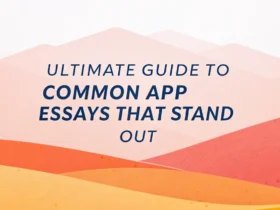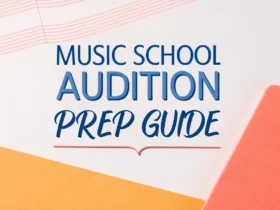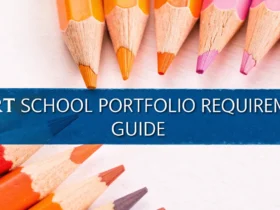Cracking the code to college admissions can feel like solving a complex riddle. With countless applications flooding universities each year, how do you ensure your voice rises above the noise? More than just grades and test scores, college application essays offer a unique space to showcase your personality, passions, and potential.
But where do you even begin?
This ultimate guide dives deep into the art of crafting Common App essays that not only meet the requirements but leave a lasting impression on admissions committees. Think of this not as a task to be dreaded, but as an opportunity to tell your story, your way. Let’s get started.
Understanding the Common App Essay
The Common Application is a standardized online application used by over 900 colleges and universities. This streamlines the application process for students applying to multiple institutions. A core element of this application is the Common App essay.
The Common App essay serves several crucial purposes:
- Showcasing your personality: The essay provides a window into who you are beyond academic achievements. It allows you to reveal your character, values, and unique perspectives.
- Demonstrating writing skills: Colleges assess your ability to articulate thoughts clearly, concisely, and effectively. A well-written essay highlights your communication skills.
- Illustrating your thought process: The essay reveals how you think, analyze, and approach challenges. It demonstrates your critical thinking and problem-solving abilities.
- Explaining your background: The essay allows you to provide context to your experiences and background, helping admissions committees understand your motivations and aspirations.
- Adding depth to your application: The essay provides an opportunity to elaborate on your interests, passions, and experiences, adding depth and richness to your overall application.
The Common App offers a set of essay prompts that are designed to encourage reflection and self-discovery. They are typically broad enough to allow students to interpret them in a variety of ways. Let’s explore what they are in 2024:
- Some students have a background, identity, interest, or talent that is so meaningful they believe their application would be incomplete without it. If this sounds like you, then please share your story.
- The lessons we take from obstacles we encounter can be fundamental to later success. Recount a time when you faced a challenge, setback, or failure. How did it affect you, and what did you learn from the experience?
- Reflect on a time when you questioned or challenged a belief or idea. What prompted your thinking? What was the outcome?
- Describe a problem you’ve solved or a problem you’d like to solve. It can be an intellectual challenge, a research query, an ethical dilemma—anything that is of personal importance, no matter the scale. Explain its significance to you and what steps you took or could be taken to identify a solution.
- Discuss an accomplishment, event, or realization that sparked a period of personal growth and a new understanding of yourself or others.
- Describe a topic, idea, or concept you find so engaging that it makes you lose all track of time. Why does it captivate you? What or who do you turn to when you want to learn more?
- Share an essay on any topic of your choice.
Choosing the right prompt is the first critical step in writing a standout college application essay. It’s not just about picking the easiest one. It’s about selecting the prompt that best allows you to showcase your strengths, experiences, and personality. Here are some points to keep in mind:
- Identify your key qualities: Brainstorm the qualities you want to highlight to admissions committees. Are you resilient, creative, intellectually curious, or compassionate? Choose a prompt that naturally allows you to demonstrate these traits.
- Consider your experiences: Reflect on the experiences that have shaped you the most. Which experiences have taught you valuable lessons, challenged your perspectives, or sparked personal growth? Select a prompt that aligns with these formative experiences.
- Think about your story: What is the story you want to tell in your college application? What are the key themes, messages, or values you want to convey? Choose a prompt that allows you to weave together the different elements of your story into a cohesive and compelling narrative.
- Read the instructions carefully: Pay attention to the specific instructions, guidelines, and expectations for each prompt. Make sure you understand what the prompt is asking you to do and how your response will be evaluated.
- Don’t force it: Avoid selecting a prompt simply because you think it sounds impressive or because you believe it’s what admissions committees want to hear. Choose a prompt that genuinely resonates with you and allows you to write authentically and passionately.
Brainstorming Ideas for Your Essay
Once you’ve chosen a prompt, it’s time to brainstorm ideas. This is a crucial stage where you dig deep and uncover the raw materials for your essay. Think of it as a treasure hunt, where you’re searching for the experiences, insights, and reflections that will make your essay truly unique.
Self-Reflection Exercises
- Timeline of formative experiences: Create a timeline of the most significant events, moments, or experiences in your life. Include both positive and negative experiences, as well as turning points, challenges, and accomplishments.
- Values and beliefs audit: Identify your core values and beliefs. What principles guide your decisions and actions? How have these values shaped your identity and worldview?
- Strengths and weaknesses assessment: Take stock of your strengths and weaknesses. What are you good at? What areas do you need to improve? How have you leveraged your strengths to overcome your weaknesses?
- Passions and interests exploration: List your passions and interests. What activities do you enjoy? What topics do you find fascinating? How do you pursue your interests outside of school?
- Biggest influences identification: Identify the people, books, events, or ideas that have had the biggest influence on your life. How have these influences shaped your perspectives, goals, and aspirations?
挖掘潜意识
- Freewriting: Set a timer for 10-15 minutes and write continuously without stopping to edit or censor yourself. Just let your thoughts flow freely onto the page.
- Mind mapping: Start with a central idea or question in the middle of a page, then branch out with related ideas, concepts, and associations.
- Journaling: Write regularly in a journal to explore your thoughts, feelings, and experiences. Use prompts to guide your reflections or simply write about whatever comes to mind.
- Storytelling: Tell stories about your life to friends, family members, or even to yourself. Pay attention to the stories that resonate most with you and the themes that emerge.
- Meditation: Practice mindfulness meditation to quiet your mind and connect with your inner thoughts and feelings. Pay attention to any insights, memories, or emotions that arise during meditation.
Identifying the “So What?” Factor
The “So What?” factor is the underlying meaning, significance, or impact of your essay. It’s the answer to the question: “Why should the admissions committee care about this story?” To identify the “So What?” factor, consider the following questions:
- What did you learn? What insights, lessons, or perspectives did you gain from your experience?
- How did you grow? How did your experience change you as a person? Did you develop new skills, values, or beliefs?
- What did you contribute? How did your experience impact others? Did you make a positive difference in your community, school, or family?
- Why does it matter? Why is your story important or relevant to the college admissions process? What does it reveal about your potential to succeed in college and beyond?
Crafting Your Essay: Structure and Style
With a clear understanding of your story and its significance, it’s time to craft your essay. This involves structuring your essay effectively and writing in a style that captures your voice and personality.
Essay Structure
- Introduction: Start with a compelling hook that grabs the reader’s attention and introduces your topic. Provide context or background information as needed, but keep it brief. Clearly state your thesis or main idea, outlining what you will be discussing in your essay.
- Body Paragraphs: Develop your thesis with specific examples, anecdotes, and details. Each paragraph should focus on a single idea or aspect of your story. Use transitions to connect your paragraphs and create a smooth flow of ideas. Show, don’t tell. Use vivid language and sensory details to bring your story to life.
- Conclusion: Summarize your main points and restate your thesis in a fresh and insightful way. Reflect on the significance of your story and its impact on your life. End with a memorable takeaway that leaves a lasting impression on the reader.
Show, Don’t Tell
- Use vivid language: Replace vague adjectives and adverbs with concrete nouns and verbs that paint a clear picture in the reader’s mind.
- Engage the senses: Describe the sights, sounds, smells, tastes, and textures of your experiences.
- Provide specific details: Use numbers, dates, and other specific details to add credibility and authenticity to your story.
- Share anecdotes: Tell short, meaningful stories that illustrate your points and bring your essay to life.
- Focus on action: Describe what you did, how you did it, and what the results were.
Your Unique Voice
- Write in your own words: Avoid using fancy vocabulary or complex sentence structures just to impress the admissions committee.
- Be authentic: Let your personality shine through in your writing. Don’t try to be someone you’re not.
- Be confident: Believe in your story and your ability to tell it well.
- Be vulnerable: Don’t be afraid to share your struggles, challenges, and insecurities.
- Be yourself: Let your unique voice and perspective shine through.
Mastering the Art of Storytelling
Your college application essay is more than just a piece of writing. It’s an opportunity to tell a story that captivates, resonates, and leaves a lasting impression. Mastering the art of storytelling involves crafting a narrative that is both engaging and meaningful.
Creating a Narrative Arc
- Exposition: Introduce the setting, characters, and background information that are essential to understanding your story.
- Rising action: Develop the conflict, challenges, or obstacles that drive your story forward.
- Climax: Reach the turning point or most intense moment of your story.
- Falling action: Resolve the conflict and show the consequences or outcomes of your actions.
- Resolution: Conclude your story and reflect on the lessons learned or insights gained.
Incorporating Vivid Details
- Use sensory details: Engage the reader’s senses by describing the sights, sounds, smells, tastes, and textures of your experiences.
- Show, don’t tell: Use vivid language and concrete details to bring your story to life.
- Create memorable images: Use metaphors, similes, and other figures of speech to create striking and memorable images in the reader’s mind.
Adding Conflict and Resolution
- Identify the conflict: What is the central challenge, obstacle, or problem that your story revolves around?
- Develop the conflict: Show how the conflict escalated or intensified over time.
- Describe your response: How did you react to the conflict? What steps did you take to address it?
- Show the resolution: How was the conflict resolved? What were the outcomes or consequences of your actions?
- Reflect on the experience: What did you learn from the conflict? How did it change you as a person?
Avoiding Common Essay Mistakes
While crafting a compelling Common App essay is essential, knowing what mistakes to avoid is equally crucial. Steer clear of these pitfalls to ensure your essay shines.
- Clichés: Admissions committees have read countless essays. Overused phrases and generic experiences won’t make you stand out. Instead, offer a fresh perspective and genuine insights.
- Too broad: Stay focused on a specific event or idea. Trying to cover too much ground can make your essay seem shallow and unfocused.
- Lack of reflection: It’s not enough to simply recount an experience. Reflect on what you learned, how you grew, and why it matters.
- Overly negative: While it’s okay to discuss challenges, avoid being overly negative or complaining. Focus on what you learned and how you overcame adversity.
- Poor grammar and spelling: Errors can distract from your message and make you seem careless. Proofread carefully and ask others to review your essay.
- Not answering the prompt: Make sure your essay directly addresses the prompt you’ve chosen. Straying off-topic can signal a lack of focus and attention to detail.
- Writing what you think they want to hear: Be authentic and genuine in your writing. Admissions committees can spot insincerity, so be true to yourself and your experiences.
Polishing Your Essay: Editing and Proofreading
Once you’ve written your essay, it’s time to polish it. This involves editing and proofreading your essay to ensure it is clear, concise, and error-free.
- Read aloud: Reading your essay aloud can help you identify awkward phrasing, grammatical errors, and areas where your writing feels disjointed.
- Seek feedback: Ask trusted friends, family members, teachers, or counselors to read your essay and provide constructive criticism.
- Revise and refine: Use the feedback you receive to revise and refine your essay. Focus on improving the clarity, coherence, and impact of your writing.
- Proofread carefully: Proofread your essay carefully to catch any spelling, grammar, or punctuation errors.
- Check formatting: Make sure your essay is formatted correctly according to the Common App guidelines.
Examples of Standout Essays
Analyzing successful Common App essays can provide valuable insights into what makes them effective. Studying these examples allows you to identify common themes, storytelling techniques, and writing strategies that resonate with admissions committees.
Example 1: The Power of Curiosity
Prompt: Describe a topic, idea, or concept you find so engaging that it makes you lose all track of time. Why does it captivate you? What or who do you turn to when you want to learn more?
Essay Excerpt:
“The hum of the server room is my symphony, the blinking lights my muse. It wasn’t always this way. My first encounter with coding was less a spark and more a sputtering ember. A required computer science class freshman year felt like navigating a foreign planet with an outdated map. Then came the moment I accidentally stumbled upon a bug in my code. Hours melted away as I hunted for the culprit, each line a tantalizing clue. The feeling when I finally squashed it? Pure exhilaration.”
Why it works: This essay captivates with its vivid imagery and genuine enthusiasm. The student effectively conveys their passion for coding by describing the sensory experience of being immersed in their world. They also share a personal anecdote about the origin of their interest, making it relatable and authentic.
Example 2: Facing Adversity with Resilience
Prompt: The lessons we take from obstacles we encounter can be fundamental to later success. Recount a time when you faced a challenge, setback, or failure. How did it affect you, and what did you learn from the experience?
Essay Excerpt:
“The audition room felt like a pressure cooker. Months of practice, countless hours of rehearsal—all boiled down to this one moment. The first notes of my cello concerto rang out, shaky and uncertain. A memory of my grandfather always saying, ‘Music will be your friend,’ echoed in my head. Then, my bow slipped. The sound was jarring, the silence that followed deafening. Disappointment washed over me, but I knew I couldn’t let it define me.”
Why it works: This essay demonstrates the student’s ability to overcome setbacks with grace and determination. The student highlights their personal growth by reflecting on how the experience taught them resilience, perseverance, and the importance of learning from failure. The vivid description of the audition room and the sound of the cello creates a sensory experience for the reader, making the story more impactful.
Example 3: Embracing Identity
Prompt: Some students have a background, identity, interest, or talent that is so meaningful they believe their application would be incomplete without it. If this sounds like you, then please share your story.
Essay Excerpt:
“Growing up in two worlds, speaking two languages, and celebrating two cultures has shaped me into the person I am today. As the child of immigrant parents, I’ve learned to navigate the complexities of identity with grace and resilience. I have learned to embrace my heritage while forging my own path.”
Why it works: This essay celebrates the student’s unique cultural background and identity with authenticity and pride. The student shares how their experiences have shaped their perspective, values, and aspirations. The essay highlights the student’s ability to navigate cultural complexities, embrace diversity, and find strength in their heritage.
Key Takeaways
- Authenticity: Genuine voice and personal experiences shine through.
- Vivid Storytelling: Engaging language and sensory details capture the reader’s attention.
- Reflection: Meaningful insights and lessons learned demonstrate personal growth.
Final Checklist Before Submission
Before you click that “Submit” button, take a deep breath and run through this final checklist. These steps will ensure your Common App essay is polished, impactful, and ready to impress admissions committees.
- Have I answered the prompt effectively? Review your essay and make sure it directly addresses the prompt you’ve chosen. Ask yourself if your essay provides a clear and insightful response to the prompt’s question or challenge.
- Does my essay tell a compelling story? Consider whether your essay has a clear narrative arc with a beginning, middle, and end. Does it capture the reader’s attention from the start and keep them engaged throughout?
- Is my writing clear, concise, and engaging? Check your essay for clarity, coherence, and flow. Are your sentences well-structured? Do your paragraphs transition smoothly from one idea to the next?
- Have I proofread carefully for errors? Review your essay for any spelling, grammar, punctuation, or formatting errors. Use a grammar checker or ask someone else to proofread your essay for you.
- Does my essay reflect my unique personality and voice? Ensure your essay sounds like you and showcases your strengths, values, and aspirations. Does it reflect your unique perspective, experiences, and insights?
- Have I received feedback from trusted sources? Incorporate the feedback you’ve received to revise and refine your essay. Ask yourself if the feedback has helped you improve the clarity, impact, and authenticity of your writing.
- Am I proud of the essay I’m submitting? Take a moment to reflect on the essay you’ve written and ask yourself if you are proud of the work you’ve done. Does it represent your best effort and showcase your potential as a college student?
Beyond the Essay: Strengthening Your Application
While your Common App essay plays a significant role in the admissions process, it’s just one piece of the puzzle. Strengthening your overall application involves paying attention to other key components, such as academic achievements, extracurricular activities, and letters of recommendation.
- Maintain a strong academic record: Focus on achieving good grades in challenging courses, particularly in subjects related to your intended major.
- Engage in meaningful extracurricular activities: Choose activities that align with your interests and passions, and demonstrate your leadership, teamwork, or commitment to service.
- Obtain strong letters of recommendation: Ask teachers, counselors, or mentors who know you well to write letters that highlight your strengths, achievements, and character.
As you prepare your Common App essay, remember that it’s an opportunity to tell your story, your way. By approaching the essay-writing process with thoughtfulness, creativity, and authenticity, you can create an essay that not only meets the requirements but also showcases your unique personality, passions, and potential.
Should you embark on this challenging yet rewarding journey of self-discovery and expression? If you want to stand out in the sea of applicants, showcasing your best self, then yes, this endeavor is for you!















Leave a Reply
View Comments